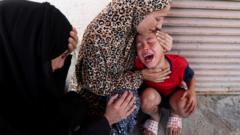Nasser Medical Complex faces a disastrous situation as medical staff warn of operational shutdowns due to acute fuel shortages and ongoing Israeli ground operations. The hospital has ceased patient admissions as Israeli military activities encroach nearby.
**Gaza's Nasser Hospital on the Brink of Catastrophe Amid Escalating Conflict**

**Gaza's Nasser Hospital on the Brink of Catastrophe Amid Escalating Conflict**
The fuel crisis at Gaza's largest hospital threatens patient care as Israeli military actions extend.
As the conflict escalates around Khan Younis, Nasser Hospital—Gaza’s largest functioning medical facility—is reaching a critical tipping point. Doctors report that life-saving services are at risk due to a severe fuel shortage, compounded by an ongoing offensive from Israeli forces in southern Gaza. The complex, heavily burdened with a surge in trauma cases, declared it could no longer accept new patients as of Thursday, following aggressive maneuvers by Israeli troops in proximity to its premises.
Witnesses have described terrifying scenes, marked by the advance of Israeli tanks and artillery fire aimed at nearby displaced families’ camps, which resulted in evacuation orders and fires engulfing makeshift shelters. The situation is dire for the medical staff and patients still relying on the hospital’s dwindlingenergy supplies. Medical personnel have communicated their fears, stating, “We are closer to death than to life,” as they face imminent shutdown within 24 hours unless fuel supplies are restored.
Despite an Israeli military statement indicating that some fuel had entered Gaza, distribution remains a significant concern, as the loading and transport logistics are not within military operational control. This latest crisis follows a track record of severe shortages in essential medical supplies, with hospitals extracting extraordinary measures just to function.
Compounding the hospital's plight is the influx of trauma victims due to ongoing military actions. Visiting officials from the World Health Organization likened the environment to "one massive trauma ward," with the hospital struggling under a patient capacity that has swelled well beyond its intended limits. Dr. Rik Peeperkorn remarked that the facility's normal capacity of 350 beds is now overwhelmed, with around 700 patients receiving emergency treatment.
In another alarming development, reports surfaced that Israeli strikes had caused civilian fatalities and injuries, further highlighting the dangerous operational landscape amid the active conflict. Meanwhile, Israeli Prime Minister Benjamin Netanyahu hinted at potential progress in ceasefire negotiations, yet the reality on the ground remains grim as humanitarian crises deepen in the region.
As of now, the humanitarian crisis in Gaza continues to agitate, with little indication of immediate relief in sight. The Nasser Medical Complex's battle for survival exemplifies the broader challenges faced by healthcare facilities in conflict zones, where the impact of war transcends borders—as does the urgency to prioritize human lives amid intensifying hostilities.
Witnesses have described terrifying scenes, marked by the advance of Israeli tanks and artillery fire aimed at nearby displaced families’ camps, which resulted in evacuation orders and fires engulfing makeshift shelters. The situation is dire for the medical staff and patients still relying on the hospital’s dwindlingenergy supplies. Medical personnel have communicated their fears, stating, “We are closer to death than to life,” as they face imminent shutdown within 24 hours unless fuel supplies are restored.
Despite an Israeli military statement indicating that some fuel had entered Gaza, distribution remains a significant concern, as the loading and transport logistics are not within military operational control. This latest crisis follows a track record of severe shortages in essential medical supplies, with hospitals extracting extraordinary measures just to function.
Compounding the hospital's plight is the influx of trauma victims due to ongoing military actions. Visiting officials from the World Health Organization likened the environment to "one massive trauma ward," with the hospital struggling under a patient capacity that has swelled well beyond its intended limits. Dr. Rik Peeperkorn remarked that the facility's normal capacity of 350 beds is now overwhelmed, with around 700 patients receiving emergency treatment.
In another alarming development, reports surfaced that Israeli strikes had caused civilian fatalities and injuries, further highlighting the dangerous operational landscape amid the active conflict. Meanwhile, Israeli Prime Minister Benjamin Netanyahu hinted at potential progress in ceasefire negotiations, yet the reality on the ground remains grim as humanitarian crises deepen in the region.
As of now, the humanitarian crisis in Gaza continues to agitate, with little indication of immediate relief in sight. The Nasser Medical Complex's battle for survival exemplifies the broader challenges faced by healthcare facilities in conflict zones, where the impact of war transcends borders—as does the urgency to prioritize human lives amid intensifying hostilities.






















